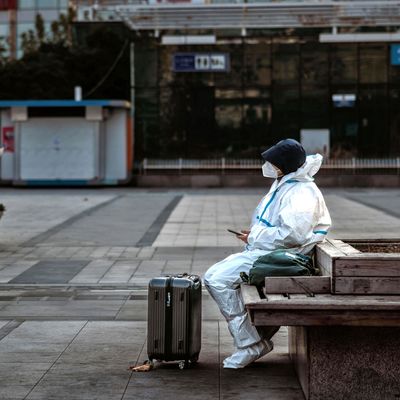
In response to the biggest protests in China since 1989, Xi Jinping’s government has abruptly reversed course on its stringent “COVID zero” restrictions. Chinese authorities have gone from attempting to contain the virus completely to assuring citizens that Omicron isn’t so bad after all. But predictably, given the lack of immunity among the population, COVID is now hitting the country hard, and there are reports of medicine shortages along with virus deaths the state won’t officially knowledge. I spoke with Darin Friedrichs, an American agricultural analyst who has lived in Shanghai for several years, to get a sense of what daily life is like as China veers from one extreme to another.
What is Shanghai like at the moment?
”Very, very quiet” is how I’d describe it. I’d gone around town a little bit at the end of last week once the policy had been reversed, and a lot of places were either closed or were just very empty. I think part of that is just because people either don’t want to get sick or they are actively sick and quarantining at home. I would estimate that probably the majority of people now, or at least within my social circle, have already tested positive or have recovered from it.
So everything is now open but empty.
What we’re starting to see is Beijing starting to get back a little bit to normal, and Beijing was hit harder and before Shanghai. So Shanghai’s probably two to three weeks behind where Beijing is. There’s obviously issues with some of the logistics and the delivery stuff. The service we use for grocery delivery said, I think, that 40 percent of their workers are out right now. Everyone is basically getting COVID all at once, but that also means that things are probably gonna be getting back to normal in a few weeks. And even though the elderly population isn’t fully vaccinated, the overall vaccine rate is very high. It seems like what we’re seeing from Beijing is that things can pop back pretty quickly.
What was the reaction at first among people you know when this zero-COVID policy was lifted? Was there any kind of euphoria at first, or was it just “Why did this take so long?”
The impression I get is just a sense of uncertainty and maybe a little bit of trepidation. For a lot of people, especially in Shanghai, 2022 has been a difficult year. Zero COVID was part of everyone’s daily life, and a lot of people did want the policy eased or thought it was too harsh. But, at the same time, I don’t know anyone that expected it to just almost be dropped overnight. So people are just still a little bit uncertain, still trying to adapt to the new environment, especially the people who have been here for all of this. I haven’t left China since COVID started. This has been three years of policy that’s being reversed very suddenly, and people are on one hand happy but on the other hand worried about getting sick and also trying to adapt to the new reality now that things are essentially back to normal.
The protests around zero COVID, the small shows of dissent, got tons of coverage in the West. Did you see any sign of that in your daily life or among people you know?
No. That was a pretty localized thing, especially in Shanghai. I think most people here would not be aware of it if they weren’t on Twitter or reading western publications.
There’s a sense in the West that Chinese people accept authoritarian rule in exchange for basic security and the hope of prosperity. And it seems that sort of bargain broke down with zero COVID since it was so irrational to keep the policy going for so long. Reading the accounts in the West, you hear about a lot of simmering frustration and anger among people, and I’m wondering if you had observed any of that in your life there.
Not really. First of all, I’d say that even though 2022 was really bad, that’s in contrast with the first two years of the pandemic, where things in China were incredibly normal. The rest of the world seemed to be on fire, and things were very safe here. So I think there’s a conflict of emotion there.
Just as an anecdote, our apartment building got locked down I think for the fourth time in late November before restrictions were eased. And among my neighbors, there wasn’t anger about the policy nationally. Most of it was just anger at the very local officials because, according to the national policy, they needed to get special permission to lock us down, and they didn’t.
It doesn’t really sound like you view this as some kind of epochal moment in Chinese history where the populace realizes the wool has been pulled over their eyes and, you know, this is gonna change everything. It’s more like there was some anger, there was a policy decision, there was a change, and now things are gonna basically snap back to the way they were.
I think a lot of people still have mixed feelings. I was in Shanghai for the lockdown, and this has been a constant theme of everyday life and being worried about getting sent off to quarantine or what happens if you test positive. So 2022 has been generally negative. At the same time, I also feel lucky to have been here during the first two years, when things were safe, I could travel, I could get vaccinated and have plenty of time to prepare. I think a lot of people have those nuanced feelings.
This interview has been edited for length and clarity.
More From This Series
- The Reporter Behind the Trump Hush-Money Trial
- What on Earth Is Aileen Cannon Doing?
- Why an Ex-MLB Interpreter Thinks Ohtani Is Telling the Truth






























